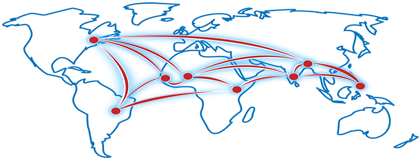Carnets de voyage
First impressions of Malawi
samedi 10 novembre 2012We arrived in Mangochi Malawi about two weeks ago. It is almost impossible to describe this place. Life here is more than the normative descriptions of development theory. It cannot be summed up simply as "poverty" and "inequality" but more like a walking Hobbes. I guess it is bringing out both the best and the worst in me. At the moment, all I have are observations.
The Malawian people appear hospitable and honest. In a small town like Mangochi, they are curious about us and crowd around calling ’Azungu’. Initially their excitement was intimidating because I have never been exposed to so much public attention and I couldn’t tell if I felt like a celebrity or an alien. But after two weeks, they have come to recognize my face and they are quick to smile and give me a thumbs-up when I pass by. I feel very welcome in this small town.
We are living in a dorm at the hospital that was built by the Flemish government. There are 50 beds with treated mosquito nets, private rooms, american toilets, hot showers, guards, locks and a gas fuelled generator to make sure that we always have electricity even when the town (or the hospital) does not. Earlier this week I invited some children into my room. They looked around in awe apparently oblivious to the dead cockroach, the trail of ants, the filth on the curtains and the ripped pillow cases. The smallest child stared at me for a while. In a small voice she asked "Are you the President’s daughter ?"
I wanted to leave this "luxury" dorm and live with a family, however on Monday I was assaulted in broad daylight by a man known to have mental problems. He dug his hand hard into my crotch. I pushed him away but stopped short. What are the consequences if I react to that type of violence ? He was shocked by my reaction and shouted at me : "You will never be my wife !" Everyone on the street stared at me. For security reasons, my internship coordinator and I agree that I should stay in the dorm.
Three meters away is the public hospital where patients with very little money can go to receive treatments. According to the medical interns, many people die due to the frequent electricity shortages (and lack of generator) that prevents the medical staff from completing surgeries. The hospital also does not have sufficient space to accommodate the line of women and children that wraps around the building each morning. Some sleep in the hallways so they do not lose their place in line. They lie on the floors with no food, no water and no protection. Their are only 10 beds in the Maternity ward. Some go into labour on the floor. These patients are not allowed to sit on the chairs. That spot is reserved for the medical staff.
Last week I walked by two children who were frantically scooping up rice that fell onto the dirt road when their bag tore in half. I kept walking. We were told not to give to people on the streets for security reasons but how can you ignore this kind of suffering ? I now know that according to them I am living in a palace. And in my need to find compensation for my guilt Ive stopped listening to this recommendation and spend my funding on the people I interact with daily. If something costs 50K I give them 80K. If I buy rice, I buy rice for someone else. I use the economy as much as I can when it goes to the right people. It is a small effort on my part but I think it goes a long way.
In Malawi the currency is called the Malawian kwacha (MK). On Friday, October 5th 2012, $1.00US is equivalent to 300MK. I asked the guards at the dorm how much they made per hour and they said that they earn a little less than 40 kwacha an hour. So what does 40MK get you ? Not much. Let’s put it this way : A coca-cola costs 100MK which means that you would have to work 2.5 hours for a soda pop. The average meal in a restaurant costs 600MK or 15 hours of work. A new piece of cloth (to wrap around the waist) costs 1,100 MK or 27 hours of work. A standard dress costs 4,500 MK or close to 3 weeks of full time work.
I also asked the accounting teachers what they earned in their profession and they said that their salary was around 75,000 MK per month. Although this is a marked increase in wage, a degree costs the average Malawian 300,000 MK ($1000) and requires children to remain in school long enough to graduate. Considering that it is mostly children working at the markets, I have a feeling that education may not be a top priority here.
Next blog I’ll post some statistics.

